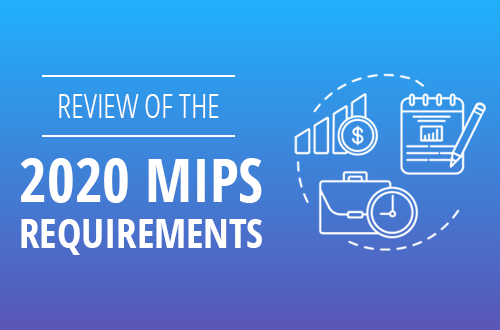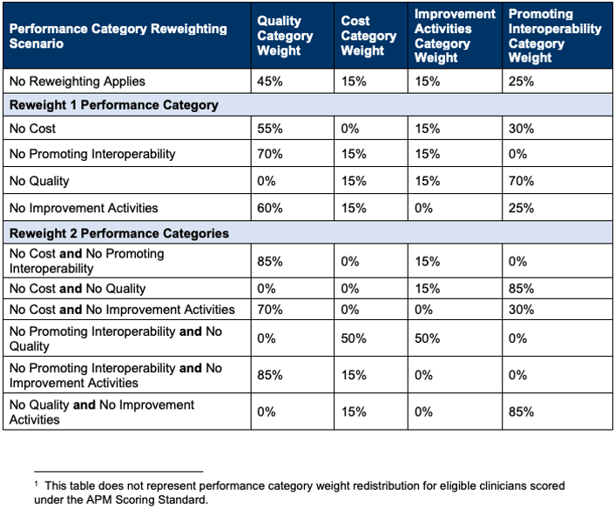MIPS 2020 Requirements

Guess what? You might actually be able to make some real money in the MIPS program next year. That's because CMS is upping the minimum and exceptional scores so more of the worst performer’s money will feed the best performers.
We are now in the fourth year of MIPS and the competition to make the most money is fierce. But the past has taught us that it's harder than we thought to make top dollar. In fact, the maximum positive adjustment from the first year of MIPS was 1.88%, even though CMS said participants could gain up to 4% for their performance.
This all changes next year, the minimum score will be harder to achieve, the amount of worst-performing clinicians will increase, the amount of exceptional performers will decrease and that means one thing - you've got an opportunity next year!
The best way to improve your MIPS performance is to learn. Here is a summary of the 2020 MIPS requirements for you to begin your studies.
*Note: CMS is allowing clinicians to submit a hardship application to reweight any or all categories to 0%.
If you participate in a COVID-19 clinical trial you may use that as a high-weighted measure in the Improvement Activity category of MIPS.
Who is Eligible for MIPS
The following types of clinicians are eligible to be a part of the MIPS program in 2020.
- Physician
- Physician Assistant
- Nurse Practitioner
- Clinical Nurse Specialist
- Certified Registered Nurse Anesthetist
- Physical Therapist
- Occupational Therapist
- Qualified Speech-language Pathologist
- Qualified Audiologist
- Clinical Psychologist
- Registered Dietitian or Nutrition Professionals
And it’s not just a title that makes you eligible for this program. You must also:
Bill Medicare more than $90,000 annually
AND
Provide care for more than 200 Medicare patients a year
AND
Provide 200 or more covered professional services to Medicare patients
If you do not meet all three of these requirements, then you are excluded from MIPS for 2020.
However, if you are anxious to get some of that positive adjustment and you would like to participate in MIPS 2020, you may opt in as long as you meet any one of those requirements. If you don’t meet any of those requirements, then you cannot opt-in to the program.
How many points do you need to score to Avoid Penalty?
Since it began in 2017, CMS has attempted to ease people into the MIPS program by increasing the minimum score gradually from 3 points in 2017, to 15 points in 2018, 30 points in 2019 and now 45 points in 2020. So CMS keeps raising the bar and it is scheduled to increase even more in 2021.
2020
Minimum Score: 45 points
2021
Minimum Score: 60 points
MIPS 2020 Payment adjustment
If you are eligible and do not achieve the minimum performance threshold of the MIPS program, you could lose up to -9% of your Medicare Part B professional fee reimbursement applied to your calendar year 2022 payments. On the flip side, you can earn up to +9% PLUS bonus money for top performers.
Note: This payment adjustment will be made to your fiscal year 2022 Medicare fee schedule.
Your score will be posted publicly
2019 marks the first year that CMS will post MIPS performance publicly. They will post your your aggregate 2018 MIPS score, and also include the minimum, maximum and final scores late this year (if technically feasible). Going forward your MIPS performance will continue to be posted each year.
Category Requirements for MIPS 2020
Each category of MIPS has a different set of requirements that you must meet in order to fully participate and have your best chance at earning incentive money.
There are four categories that make up the MIPS program.
 |
 |
 |
 |
| Quality |
Promoting Interoperability |
Improvement Activities |
Cost |
Each of these categories carries a different weight. Your score in each category will be totaled into one final MIPS score.
In response to COVID-19, CMS is allowing Eligible Clinicians to reweight any or all of these categories. Clinicians must apply for an exception and be approved to have their categories reweighted.

 QUALITY CATEGORY
QUALITY CATEGORY
Maximum Points: 60 points
Category is Worth: 45% of total MIPS score
Performance Period: 365 days
Requirements:
 |
Report a total of six Quality measures to CMS. |
 |
Submit at least one Outcome measure unless there is not one available in your specialty measure set. If that is the case, you can report another High Priority measure in its place. |
Other Considerations
Submit Multiple Types of Quality Measures
You may submit measures using multiple collection types – for instance, you can submit eCQMs, MIPS CQMs (formerly registry measures) and QCDR measures. CMS will use the measures with the highest scores.
Claims Submissions for Small Practices Only
You can only submit your Quality measures as claims if you are an eligible clinician in a small practice.
CAHPS for MIPS
Submitting the MIPS CAHPS Survey, will count as reporting one High Priority measure. Select five other Quality measures to report, including an Outcome measure if available.
Case Minimum
Quality measures must meet the 20-case minimum to be scored.
Data Completeness
Measures must contain at least 70% of all Eligible Clinician patients across all payers.
CMS will not calculate the All Cause Readmission measure in 2020
Originally, CMS intended to include the All Cause Readmission measure (as they usually do) for any groups that include 15 or more clinicians. The All Cause Readmission measure is based on administrative claims data but only if there are 200 or more attributed hospitalizations. In previous years that would make your max score in this category 70 points, but, due to the COVID-19 pandemic, CMS is not calculating that measure in 2020.
 PROMOTING INTEROPERABILITY CATEGORY
PROMOTING INTEROPERABILITY CATEGORY
Maximum Points: 100 points
Category is Worth: 25% of total MIPS score
Performance Period: 90 days (minimum)
Requirements:
| Report on all required measures from each of the four objectives. | |
| You must use EHR technology certified to the 2015 edition of CEHRT. |
Other Considerations
Must report on all measures
If you do not report on any of the required measures (or if you do not claim an exclusion) you will receive a total score of zero in this category.
Automatic Reweighting of the PI category
CMS will automatically assign a weight of zero to this category for the following clinician types: NP, PA, CRNA, CNS, PT, OT, Speech Pathologist, Audiologist, Clinical Psychologist, Registered Dietitian. If, however, you want to participate in this category, you may submit the data in this category and you will be scored according to your performance. If you are submitting as a group and would like this category reweighted, then 75% of your group must meet CMS's definition of a hospital-based clinician.
Security Risk Analysis Measure
Even though the Security Risk Analysis measure will award you no points in 2020, you are still required to attest to having completed the actions included in this measure at some point during the calendar year.
 IMPROVEMENT ACTIVITIES CATEGORY
IMPROVEMENT ACTIVITIES CATEGORY
Maximum Points: 40 points
Category is Worth: 15% of total MIPS score
Performance Period: 90 days (minimum)
Requirements:
| Report a combination of Improvement Activity measures (up to four measures) to equal a total of 40 points. | |
 |
Groups with <15 participants or groups in a rural or health professional shortage area have their points doubled in this category. |
Other Considerations
Group Submissions
If you are submitting as a group, at least 50% of your group's clinicians must attest to completing the same improvement activity for 90 consecutive days. The activity may be completed anytime within the calendar year so long as each person attesting completes the activity for 90 consecutive days.
Patient-Centered Medical Homes
If you are a Patient-Centered Medical Home and more than 50% of your practices are recognized as a PCMH, you automatically receive full credit for this category.
COVID-19 Clinical Trials
If you participate in a COVID-19 clinical trial you may use that as a high-weighted measure in the Improvement Activity category of MIPS. Read the CMS press release. At least 50% of your clinicians in the TIN must participate in the improvement activity.
 COST
COST
Category is Worth: 15% of total MIPS score
Performance Period: 365 days
Requirements:
 |
CMS will evaluate your performance on these two measures: Medicare Spending per Beneficiary (MSPB) and Total Per Capita Cost. |
 |
CMS will evaluate your performance on the following 18 episode-based measures. |
| Measure Name |
| Elective Outpatient Percutaneous Coronary Intervention (PCI) |
| Knee Arthroplasty |
| Revascularization for Lower Extremity Chronic Critical Limb Ischemia |
| Routine Cataract Removal with Intraocular Lens (IOL) Implantation |
| Screening/Surveillance Colonoscopy |
| Intracranial Hemorrhage or Cerebral Infarction |
| Simple Pneumonia with Hospitalization |
| ST-Elevation Myocardial Infarction (STEMI) with Percutaneous Coronary Intervention (PCI) |
| Acute Kidney Injury Requiring New Inpatient Dialysis |
| Elective Primary Hip Arthroplasty |
| Femoral or Inguinal Hernia Repair |
| Hemodialysis Access Creation |
| Inpatient Chronic Obstructive Pulmonary Disease (COPD) Exacerbation |
| Lower Gastrointestinal Hemorrhage |
| Lumbar Spine Fusion for Degenerative Disease, 1-3 Levels |
| Lumpectomy, Partial Mastectomy, Simple Mastectomy |
| Non-Emergent Coronary Artery Bypass Graft (CABG) |
| Renal or Ureteral Stone Surgical Treatment |
Other Considerations
Case Minimums
CMS requires a case minimum of 35 for the MSPB measure and 20 for the Total Per Capita Cost measure.
CMS also requires a minimum of 10 episodes for the procedural measure types and 20 episodes for the acute inpatient medical condition measure types.
Reporting Options
In 2020, you may choose to report as an individual, group, large practice or virtual group.
Individual
This is defined as a single National Provider Identifier (NPI) tied to a single Tax Identification Number (TIN).
Group
Reporting as a group is defined as two or more clinicians (identified by their NPIs) sharing a common TIN. You must report group-level data for each MIPS category.
Large Practice
Large practices with >25 providers may choose to report via the CMS Web Interface. For this reporting option you must report on all CMS Web Interface measures with a full year’s worth of data.
Virtual Group
Individual clinicians and small groups have the option of coming together to form one virtual group that can report together. Groups must be comprised of 10 or fewer Eligible Clinicians and, as a group, exceed the low-volume threshold.
Note: If you choose to participate in a Virtual Group, you must tell CMS prior to December 31, 2019.
MIPS Final Score 2020
MIPS 2020 Score Threshold
To avoid a -9% penalty, you must score at least 45 points.
To be eligible for the Exceptional Performance bonus money you must score at least 85 points (Exceptional Performance Bonus).
Your score will be posted publicly
2019 marked the first year CMS posted MIPS performance publicly. Going forward your MIPS performance will continue to be posted each year.
Reimbursements
.png?width=798&name=MIPS_Budget_Neutral_Graphic_2020(withmoney).png)
0-45 Points
If you do not meet the 45-point, performance threshold in 2020, you can lose as much as -9% from your 2022 Medicare fee schedule (in red above).
45-100 Points
CMS will take the funds of those who did not meet the threshold (in red) and distribute them among those who did meet the threshold (in green). Anyone whose MIPS score is between 45 and 100 points will receive some portion of those funds – up to a 9% increase to their 2022 Medicare fee schedule.
85 Points
By scoring at least 85 points, you’ll be eligible for the Exceptional Performance bonus money (on the right). CMS has set aside an additional $500 million to distribute to anyone who scores between 85 – 100 points. This is on top of whatever portion of money you receive from those who do not participate (in red).
MIPS 2020 Bonus Points
There are many opportunities to get bonus points within the MIPS program.
Improvement Bonus: Up to 10 Points
Clinicians will be rewarded if they demonstrate any improvement to their 2020 Quality score over last year (pending there is enough data for comparison).
Electronic Submission: Up To 6 Points
Receive up to 6 bonus points by submitting your Quality measures via electronic submission.
Additional Measure Submission: Up to 6 Points
By submitting additional Outcome (2 points) or High Priority measures (1 point) in the Quality category, you can be rewarded up to 6 bonus points.
Opioid measure bonus: Up to 10 Points
Report on either or both of these measures and receive 5 bonus points for each measure in the PI category: Query of Prescription Drug Monitoring Program and/or Verify Opioid Treatment Agreement.
Complex Cases Bonus: 5 Points
For clinicians who work with patients that have more complex cases, CMS will award up to 5 bonus points to the clinician’s MIPS final score.
Small Practice Bonus: 6 Points
An additional 6 bonus points will be added to the numerator of the Quality category for anyone qualifying as a small practice.
COVID-19 Flexibilities
There is no blanket waiver for 2020 MIPS. Instead, clinicians who were significantly impacted by COVID-19 may submit an Extreme & Uncontrollable Circumstances Application to reweight any or all of the MIPS performance categories.
During the application process you will be able to select which categories you want reweighted. If approved, your selected categories will be reweighted to 0%. At that point any data submission overrides the performance category reweighting approved through your application.
So, if you ask CMS to reweight all categories to 0% and then later decide to submit Quality and Improvement Activity data your MIPS score will be calculated on those categories using the weighting below.

If you reweight more than two categories (which you can do but is not shown in the chart above) you will automatically get a score of 45 points and receive a neutral payment adjustment in the 2022 payment year.
Important Dates to Remember
January 1, 2020 is the start date to track 365 days of Quality and Cost category measures. For the Promoting Interoperability category and the Improvement Activities category, you may start between January 1 and October 2, 2020 to track your measures for a minimum of 90 days.
The last day to submit a hardship application to CMS is December 31, 2020.
The last day to submit all of your performance data is March 31, 2021.
|

.png?width=352&name=2026%20Quality%20Reporting%20Deadlines%20Guide%20(1).png)



Comments